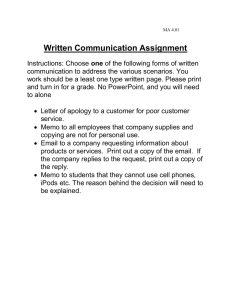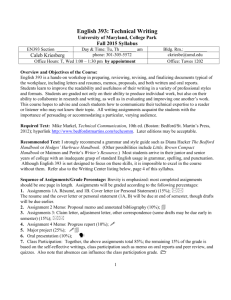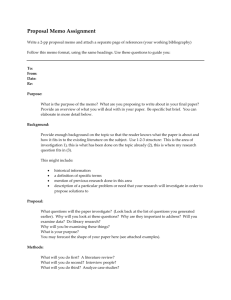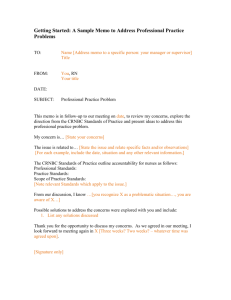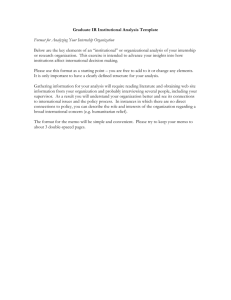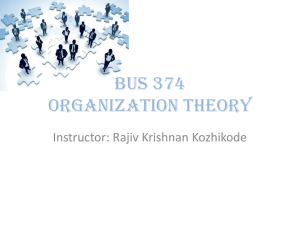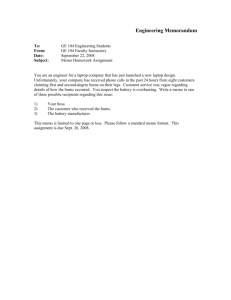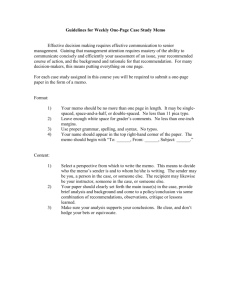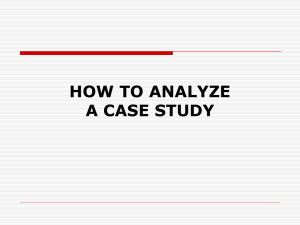English 393: Technical Writing
advertisement
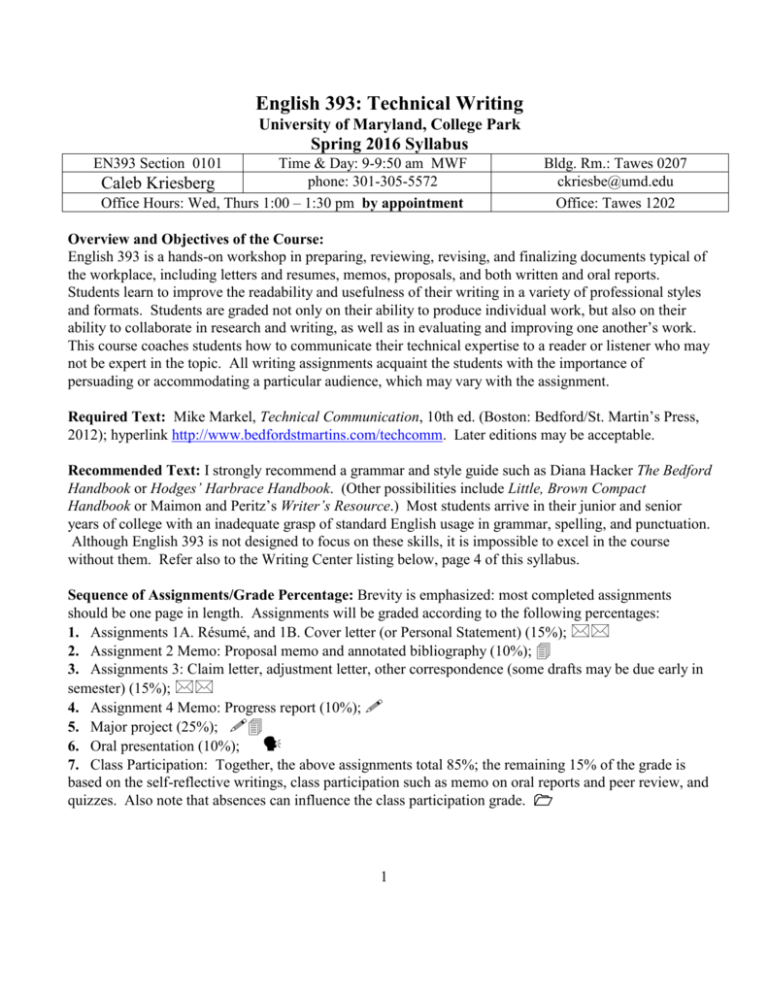
English 393: Technical Writing University of Maryland, College Park Spring 2016 Syllabus EN393 Section 0101 Time & Day: 9-9:50 am MWF phone: 301-305-5572 Caleb Kriesberg Office Hours: Wed, Thurs 1:00 – 1:30 pm by appointment Bldg. Rm.: Tawes 0207 ckriesbe@umd.edu Office: Tawes 1202 Overview and Objectives of the Course: English 393 is a hands-on workshop in preparing, reviewing, revising, and finalizing documents typical of the workplace, including letters and resumes, memos, proposals, and both written and oral reports. Students learn to improve the readability and usefulness of their writing in a variety of professional styles and formats. Students are graded not only on their ability to produce individual work, but also on their ability to collaborate in research and writing, as well as in evaluating and improving one another’s work. This course coaches students how to communicate their technical expertise to a reader or listener who may not be expert in the topic. All writing assignments acquaint the students with the importance of persuading or accommodating a particular audience, which may vary with the assignment. Required Text: Mike Markel, Technical Communication, 10th ed. (Boston: Bedford/St. Martin’s Press, 2012); hyperlink http://www.bedfordstmartins.com/techcomm. Later editions may be acceptable. Recommended Text: I strongly recommend a grammar and style guide such as Diana Hacker The Bedford Handbook or Hodges’ Harbrace Handbook. (Other possibilities include Little, Brown Compact Handbook or Maimon and Peritz’s Writer’s Resource.) Most students arrive in their junior and senior years of college with an inadequate grasp of standard English usage in grammar, spelling, and punctuation. Although English 393 is not designed to focus on these skills, it is impossible to excel in the course without them. Refer also to the Writing Center listing below, page 4 of this syllabus. Sequence of Assignments/Grade Percentage: Brevity is emphasized: most completed assignments should be one page in length. Assignments will be graded according to the following percentages: 1. Assignments 1A. Résumé, and 1B. Cover letter (or Personal Statement) (15%); 2. Assignment 2 Memo: Proposal memo and annotated bibliography (10%); 3. Assignments 3: Claim letter, adjustment letter, other correspondence (some drafts may be due early in semester) (15%); 4. Assignment 4 Memo: Progress report (10%); 5. Major project (25%); 6. Oral presentation (10%); 7. Class Participation: Together, the above assignments total 85%; the remaining 15% of the grade is based on the self-reflective writings, class participation such as memo on oral reports and peer review, and quizzes. Also note that absences can influence the class participation grade. 1 Assignment Submission Requirements: Assignments are due at the start of class on the date indicated on the course schedule and assignment sheet. Papers should meet, not exceed, required length. In general, for our assignments, use 12-point font size, one inch margins, and left-side justification only. Title or cover pages should follow format suggested in text, such as p. 533, but should include section number; no font larger than 14, no bold, no italics, no “quotes,” nor underlines except for references to other sources; include date and student and teacher’s name. Staple the pages. On rare occasions I may accept papers submitted via email. Keep all of your drafts, as well as in-class work. Late Papers: Late papers may be lowered one letter grade. No computer or illness excuses (without offcampus doctors’ notes) for late papers will be accepted. Please be aware that, this course encourages revisions, sometimes after the due date, but there must be an end to collecting revised papers, so be alert to deadlines for revisions. Grade Requirements for Passing: Warning Note: You must attempt all of the required papers listed 1.-5., above, to pass the course. You generally may rewrite the graded paper one time, after consulting with me, to attempt to raise the grade, for example to a C or better (final grade equals average of two grades). But progress reports (Assignment 4) and probably one of the correspondence letters cannot be revised for a higher grade. Deadlines for these revisions will be announced (also see Course Schedule). Attendance and Class Environment: Since collaborating with classmates in this course is important, so is attendance. You should notify me ahead of time if you expect to be absent, or at least send me a note of explanation after. Students are allowed a maximum of two absences. Each additional absence may reduce the class participation portion of the grade (each absence counts as a 5% penalty, up to a maximum of 15% total). Absences due to illness or a death in the family do not count in this tally, but still need to be accounted for, either via email or by talking to me prior to class. Two tardinesses of ten minutes or more count as one absence. If you are absent, stay current with the class by contacting another student about what was covered that day; do not write requesting me to do so. During class, I expect attentiveness and participation. Turn off all cell-phones and other electronic equipment before you enter class. Check with me if you take class notes via computer. Students are responsible for all material covered in class. As this is not a lecture course, your contribution is critical. Listen actively, share from your experiences, and ask informed questions. Thank you. Grading Criteria: The letter grades you receive in this course might be considered equivalent to evaluations received in the workplace, thusly: An A document is excellent work: it succeeds and receives praise. The audience analysis is insightful, the topic precise, the organization of the argument is clear and logical. The document contains sufficient detail, the information is accurate, timely, clear, and comprehensive. Your supervisor would be impressed and would pass the document along to other supervisors, without revision. A B document is good work. It might have almost all the virtues of an A document, but one or more of the elements is flawed. For instance, persistent spelling errors could reduce an A document to a B. Your 2 supervisor would appreciate your work but would want you to revise it before passing it along. A C document indicates work that is merely adequate. It may technically satisfy the requirements of the assignment, but is significantly flawed. Your supervisor would be disappointed with the document, and would want someone else to revise it before passing it along. In addition, the supervisor would begin to doubt your ability to complete similar assignments successfully. A D document is unsatisfactory. Although some aspects of the document might be well done, on the whole there are significant problems with conception or execution. Your employer would question your basic competence and suitability for your position. An F document is failing work. It is submitted after the deadline, it does not respond to the assignment, it is extremely difficult to read, or it is unprofessional in appearance or writing quality. Your supervisor may advise you to update your resume and visit Human Resources. Self-Reflective Writings: These short writing assignments are designed to gauge your response to issues arising in class as well as in the everyday professional world. You might reflect on the process of writing, on experiences in the work place, and the development of your major project. Please keep a record or copy of this work. I will call for these writings three times during the semester and evaluate them -- ( +, , or -) -- according to the degree of engagement. These evaluations eventually are included in the 15% class participation score. Major Project (Assignment 5): Students examine a current problem or need, and after research and analysis, propose a feasible solution; OR, students prepare a manual on how to make or do something professionally. Either option must be researched, and should be original and fully documented. Both will continue the research begun in Assignment 2 (project memo and annotated bibliography) and Assignment 4 (progress report and audience analysis). As you choose your topic, you should consider credibility, jurisdiction, time-frame, and – especially -- audience. Oral Presentation: Each student will be called upon to give brief oral presentation (Assignment 6), on the major project (Assignment 5). You might choose to begin by checking the class’s knowledge of your topic, and end with a question for the class to discuss. (Later, as part of class participation, each student will write a memo reporting on one of these oral presentations.) Professional Writing Program Office: The PWP Office is located in Tawes 1220. Any documents submitted through the PWP should go in the drop box outside the main PWP entrance. Be sure to put my name on any document you submit, and let me know you are sending me the work this way. The PWP website is: http://www.engl-pw.umd.edu/index.htm. Academic Integrity: The University has approved a Code of Academic Integrity (http://www.shc.umd.edu/code.html) which prohibits students from cheating on exams, plagiarizing papers, submitting the same paper for credit in two courses without authorization, buying papers, 3 facilitating academic dishonesty, submitting fraudulent documents, and forging signatures. Plagiarism policy: all quotations taken from other authors, including from the Internet, must be indicated by quotation marks and referenced. Paraphrasing must be referenced. If you copy more than two consecutive words of a text source without attribution, it may also be considered plagiarism. If you get your ideas from someone else, even from a student, you should credit that source. In this class, as in all other endeavors at the University of Maryland, scholarly integrity is indispensable. Intentional, egregiously deceptive plagiarism, especially for the research project, would result in automatic failure for the paper, if not for the course. A plagiarist may also be called before the Student Honor Council, the Office of Judicial Programs, and expelled from the university. You are expected to do your own work, and are responsible for reading and understanding the definition of plagiarism. If you have questions, ask me, or see the Office of Judicial Programs and Student Ethical Development website (www.jpo.umd.edu/). The Writing Center: Individual tutoring is available at the Writing Center at no cost for all students. Open beginning the second week of classes, the center’s hours are Monday-Thursday 9:00 a.m.-4:00 p.m., Friday 9:00 a.m.-2:00 p.m.; and Monday, Tuesday, and Wednesday 5:00-8:00 p.m. The location is Tawes 1205; the phone is (301) 405-3785. For appointments and information, log on to www.english.umd.edu/writingcenter. Remember, this is a tutoring center, not an editing service. It will help both the tutor and yourself if you clarify your goals on a given writing project at the start of your session. The center also sponsors The Grammar Hotline, available at (301) 405-3785. Disabilities: Inform me at the beginning of the semester if you have a verified disability. If you need course adaptations or accommodations because of a documented disability or if you have emergency information to share, please contact the Disability Support Service at (301) 314-7682. This will ensure that you are properly registered for services. Career Center: Students may wish to make use of the resources of the Career Center on the 3rd floor of Hornbake Library. The center is designed to help you prepare job, internship, graduate school, or professional school application materials. Course Evaluation: Confidential on-line course evaluation will be open during the final two weeks of classes via the website www.courseevalum.umd.edu. I hope all students will participate. We may also conduct written course evaluations in class. Syllabus and schedule adapted, with permission and appreciation, from Prof. Kelly Cresap. Last edited 1/2016 4 Spring 2016 EN393 Schedule Monday, January 25 – Monday, May 9 This course schedule is subject to revision! Read the day’s text assignments before class. All chapter and page numbers refer to Mike Markel’s Technical Communication, 10th Edition. Jan. 25 Introduction to Technical Writing. Student questionnaire, in-class introductions. Introduction to Major Project (Assignment 5). Introduction to audience. Jan. 27 Introduction to Ethos/Logos/Pathos. What are exigence and jurisdiction? Read Markel Ch. 1 (Intro). Continue brainstorming Major Project (Assignment 5) topics and strategies. Possible in-class self-reflective writing. Jan. 29 Read Ch. 4 (Collaboration) and pp. 405-417 (Writing Paper Résumés). Discuss peer review strategies and methods. Bring the latest draft of your résumé, with job ad (Assignment 1A), for an in-class peer review. Possible introduction to complaint-adjustment correspondence, and general correspondence. Feb. 1 Feedback on resumes. Read Ch. 5 (Audience and Purpose). Work on Major Project strategies and development, brainstorming. Read Ch. 6 (Research). Possible ELMS discussion board post on Jack London’s “Cruise of the Snark” – “Adventure” due. Feb. 3 Read Ch. 15, pp. 371-375 and 425-431(Job Application Letters); bring to class cover letter (Assignment 1B) to go with resume, for peer review. Possibly more on complaint-adjustment letters. Feb. 5 Read Ch. 2 (Ethics), More rhetorical Triangle discussion: audience, context, purpose. Discussion of Snow’s “Two Cultures” and ELMS discussion board posting due. Feb. 8 Major Project brainstorming day. Possible in-class quiz on syllabus and first lessons. Feb. 10 Read Ch. 3 (Planning), Ch. 16 (Proposals), Ch 20 pp. 598-604 (Manuals). Group info-gathering for Major Project topics. Choose your Major Project options. Possible review of grammar, punctuation, etc. Feb. 12 Assignment 1A, 1B due: Résumé and cover letter or personal statement. Feb. 15 Possible Alternate venue: Individual conferences (possibly no regularly scheduled class). Conferences would meet in my office, in Tawes 1202. All students must come with Major Project topic to discuss. It’s best to have more than one topic in mind. Feedback on resume, cover letter. Feb 17 Read Ch. 14 pp 369-390 (Letters, memos, emails); introduction to the memo format 5 vs. the letter correspondence format. Also bring draft of complaint adjustment letter (if part of Assignment 3). Possibly, also read Ch. 19 pp. 513-523 (Recommendation Reports) and Ch. 10 (Effective Sentences). Feb. 19 Possible Alternate venue (continued): Individual conferences (possibly no regularly scheduled class). See previous class meeting’s reading assignments for your project memo (portions of chapters 14, 16, 19, 20). Bring draft of Project Report Memo (Assignment 2) along with list of sources for annotated bibliography. Note: The Fall Career and Internship Fair 2016 is set for Feb. 24 – 26, Wed. through Fri., Stamp Student Union. Feb. 22 Possible Alternate venue: Class may meet at McKeldin 6101 (6th floor) for a guided Library Research Session led by librarian. Feb. 24 Bring draft of Assignment 2 (Project Report memo and annotated bibliography) for peer review. Feb. 26 Feedback on Assignment 2 memo. Possible further review of grammar, punctuation, style, etc. Feb. 29 Assignment 2 Memo due (Project Report memo and annotated bibliography). Peer review of this memo. March 2 Review Ch. 14 pp 369-390 (Letters, memos, emails). Discuss claim letters, choose potential topic for your letter. March 4 Bring copy of Assignment 3 Claim Letter draft for peer review. Review Markel Chs. 8 and 11 on written and visual forms of persuasion. March 7 Feedback on claim letter. Discuss Audience Analysis writing. Possibly Midsemester in-class reflective writing. (Keep working, also, on your major project, Assignment 5, this week.) March 9 Read Ch. 9 (Coherence), Ch. 19, pp. 523-531 (Front and Back Matter). Catch-up on class work, including Complaint-Adjustment letter. March 11 Any Assignment 2 Memo Rewrites due. NO CLASS MARCH 13 – 20 -- SPRING BREAK March 21 Assignment 3 Complaint-Adjustment letter – if part of Assignment 3 -- due. Verbal pitch exercise – possible coaching, individual follow-up. March 23 Read Ch. 17 (Informational Reports). March 25 Assignment 3 Claim letter due. Bring two copies of Assignment 3 Claim letter, one for me and one for classmate. Peer discussion of letters. 6 March 28 Bring draft claim adjustment letter to class; peer discussion. March 30 Feedback, if any, on claim adjustment letters. Bring all materials related to Major Project. Write Assignment 4 (Progress Report/Audience Analysis) draft in class. April 1 Assignment 3 Claim-adjustment letter due. April 4 Bring draft of Assignment 4 (Progress Report/Audience Analysis) for peer review. April 6 Feedback on Assignment 4 memo draft. Read Ch. 20 (Definitions and Descriptions). Bring to class a definition from a government or company website, for use either as a model or good or bad definition writing. (This is especially useful for those writing a manual for Assignment 5.) April 8 Assignment 4 Memo due (Progress Report/Audience Analysis). April 11 Read Ch. 7 (Organizing Information). Bring a draft of two to three pages from the introduction, or at least your table of contents, of your Major Project for peer discussion. April 13 Bring a revised draft of at least three pages from the middle section of your Major Project for peer review. April 15 Introduction to Oral Presentations. Possible viewing of online oral presentations. April 18 Any Assignment 3 Re-writes due. Read Ch. 21 (oral presentations). Prepare for, plan Oral Presentations. Vocal coaching, troubleshooting, and viewing of online oral presentations. April 20 How to write a memo about an oral presentation. April 22 Begin Oral Presentations (Assignment 6) April 25 Oral Presentations continued and/or more discussion, feedback on Major Project. Memos on Oral Presentations turned in on flow basis, depending on students’ choice of presentation to report on. April 27 Oral Presentations continued and/or more discussion, feedback on Major Project. April 29 Assignment 5 due (Major Project). Oral Presentations continued. May 2 Oral Presentations continued. May 4 Oral Presentations continued. Last (third) reflective writing, in-class. May 6 Oral Presentations. May 9 Complete Oral Presentations. Last Memos on Oral Presentations due. Course wrap- 7 up and evaluation. (Last edited 1/2016. Adapted, with permission and my appreciation, from syllabus and schedule of colleague Dr. Kelly Cresap with additional input from colleague Pam Orel) 8
